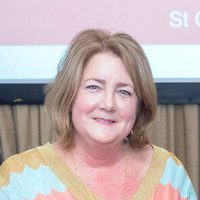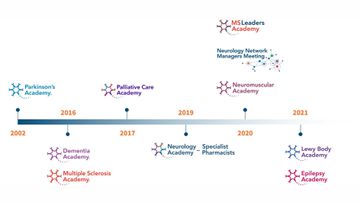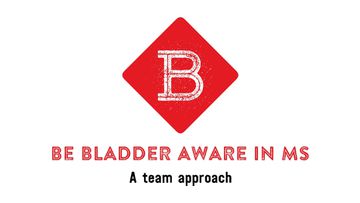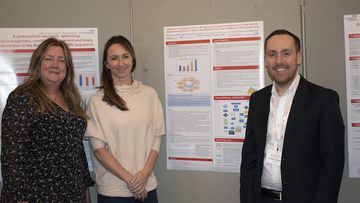A specialist nurse's journey through Neurology Academy
NewsNurses are an incredibly valuable group of individuals within our healthcare workforce, often covering a wide variety of roles and drawing on a great deal of compassion, expert knowledge and experience to provide essential care and support to people living with a multitude of conditions.
We are privileged to have two nurses on our staff - our Head of Parkinson's Academy, Daiga Heisters, and our new Head of Nursing, multiple sclerosis (MS) specialist nurse Ruth Stross. Her journey with the Academy has been inspiring, and this International Nurses Day, we interviewed her so that we can share it with you.
Ruth was five years old and living in Kenya when she decided she was going to be a nurse.
Ruth Stross
Director of services, MS Trust

In Kenya, early 1970s, 5 year old Ruth decided she would be a nurse when she grew up - so she did
After almost thirty years of clinical practice in Australia and the UK, working in neurology and neurosurgery as a ward nurse, specialist nurse in motor neurone disease, Parkinson’s, movement disorders and MS, Ruth began her journey with the MS Academy as a delegate in 2019.
She is the first person to win both the Intermediate and Advanced MasterClass intermodule projects, and was also one of only two specialist nurses on the Leadership Academy's inaugural course in 2020.

Ruth's journey: the past three years…
Ruth's Intermediate MasterClass project to map an MS pathway in her area was conducted in partnership with Dr Ioana Cociasu, clinical fellow in neurology, and a poster and presentation of the work can be found online.
Her Advanced project was awarded first place just this month, in partnership with Dr Victoria Wallace, a neurologist ST6. They worked to establish a pathway to screen for people experiencing cognitive impairment in MS and provide appropriate referral to neuropsychology. Their project set out the feasibility study for using a validated measurement tool, the Symbol Digit Modality Test (SDMT) from the Brief International Cognitive Assessment for Multiple Sclerosis (BICAMS), as part of clinical assessment at diagnosis, and then within routine clinic assessments thereafter to compare against baseline and monitor for change.
Her mapping work found a gap in bladder management which led to, initially, a local bladder management pathway for MS. During the pandemic, Ruth instigated an at-home urine testing kit to monitor for urinary tract infections, which can be more common amongst people with MS when on a disease-modifying therapy, and can lead to hospitalisation if left undetected.
Over the past year or so, Ruth has begun to draw on her experience and knowledge to support education and influence policy. She has chaired and spoken at several educational events such as MS Academy webinars and MS Trust conferences, and becoming a member of the MS Academy faculty.
Her work in bladder management locally led to involvement in an expert group promoting people to be #BeBladderAwareinMS. The group has developed a consensus guidance document and is now finalising a national pathway modelled on the OPTIMUM pathway for MS.
Outside of neurology, she has become a member of the Menopause Steering Group, NHS England & NHS Improvement who are currently updating the NICE for menopause due to be published this year. Her role is within the Task and Finish group looking at improving national education for non-specialists, of which she includes herself.
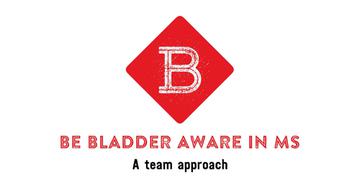
She has also been appointed Head of Nursing at Neurology Academy, a brand new position focussed on improving educational support to specialist nurses working across a variety of conditions and looking at a wide variety of areas beyond the 'day job', including care pathway design, service planning and delivery, policy and the prevention agenda.
Related articles
Uniquely practical education, producing specialist clinical leaders transforming local healthcare
Neurology Academy is an innovative educational provider for healthcare professionals including consultants, specialist nurses, pharmacists, therapists and other allied health professionals. Our courses are developed by practicing specialists who combine their experience and expertise into case-based learning designed to create specialists in their field with confidence in effecting change.
